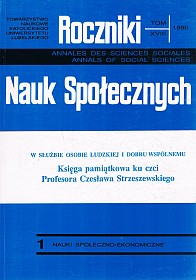Religijna koncepcja sensu życia
Abstrakt
The problem of giving sense to human life, determining aims and values which man could conform with and according to which he could live in a constructive manner is an important cognitive function of religion. The conjunction of the sense of life and religious faith is very close but not exclusive. The underlying question in the question about the sense of life and religious faith is the question about God. Taking this basic premiss as his starting point the author analyzes in the present paper the sense-making functions of religion, the relation between the sense of life with the problems of death, the relation: current sense − eternal sense (do they stand in opposition or are they complementary?) as well as individual and fellowship dimensions of the sense of life.
The fact that one finds sense of human life in faith and through faith does not mean that he turns away from mundane affairs, but rather that he takes them in their fuller meaning and interpretation. In the situation in which there are competing systems of values as well as individual and social tensions a majority of Catholics expect of the Church help which would direct them how to behave. What the Church has to offer in the sphere of making one’s life sensible is Her clear chance also in the pluralistic society. As long as the man will struggle with the ultimate problems of his existence so long will there be a place for religious interpretations of his life.
Copyright (c) 1990 Roczniki Nauk Społecznych

Utwór dostępny jest na licencji Creative Commons Uznanie autorstwa – Użycie niekomercyjne – Bez utworów zależnych 4.0 Międzynarodowe.


